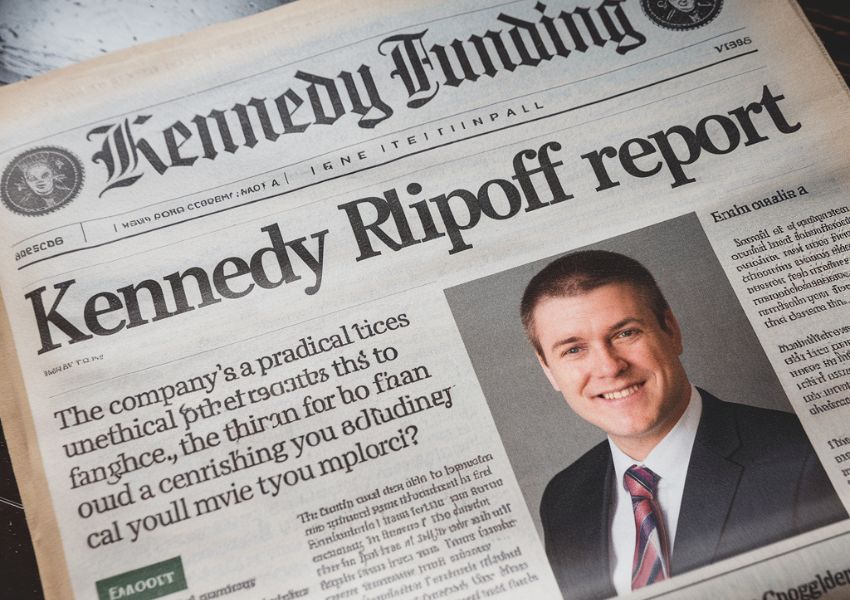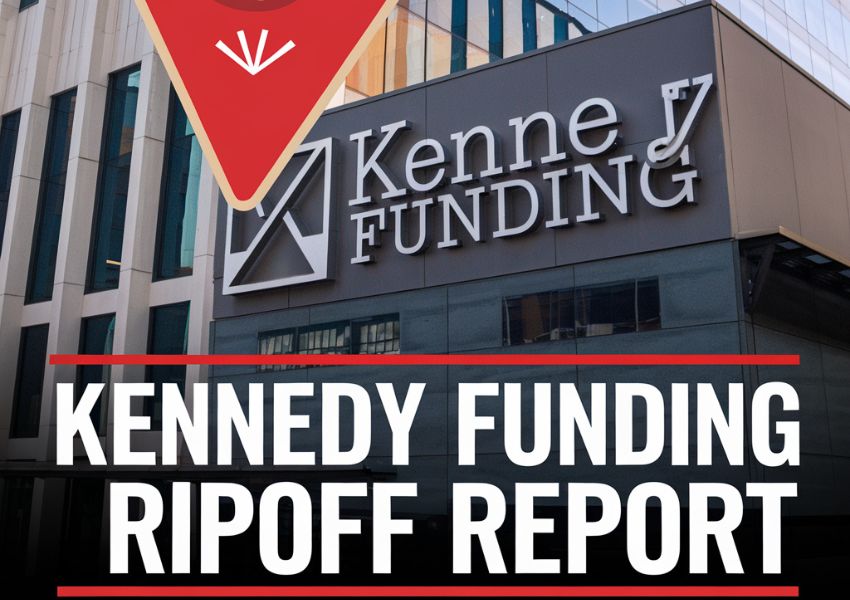In recent years, private lending has emerged as an alternative route for businesses and real estate developers looking to secure capital quickly. Kennedy Funding, one of the notable names in the private lending sector, has made headlines for various reasons—some positive, others controversial. Search for the “Kennedy Funding Ripoff Report,” and you’ll find an array of opinions, allegations, and reviews that require thorough examination. With financial practices in private lending under scrutiny, understanding both sides of Kennedy Funding’s business model and reputation is essential.
Introduction
Kennedy Funding is a private, asset-based lender headquartered in Englewood Cliffs, New Jersey. Specializing in hard-money loans for commercial real estate and development, the company provides loans in situations where traditional lenders may hesitate, like bridge loans, workouts, and more. Known for fast approval processes, Kennedy Funding has played a vital role for clients needing funding solutions outside the constraints of standard banking.
Why Private Lending Has Become Popular
Private lending fills a gap left by conventional banks, particularly when fast funding is crucial. Often, private lenders serve businesses facing time-sensitive deadlines, credit issues, or needing a non-traditional financing approach. However, private loans typically come with higher interest rates, origination fees, and a level of risk that borrowers must weigh carefully.
How Kennedy Funding Operates
Kennedy Funding’s loan model is built on asset-based lending, where the loan is secured against collateral, usually real estate. This approach lets them take on higher-risk projects than banks might consider, albeit with specific criteria and higher fees to manage that risk.
The Appeal of Private Lending and Its Risks
The private lending appeal lies in its ability to offer rapid funding for real estate projects and developments that would otherwise struggle to secure bank loans. However, this convenience comes with risks, like higher interest rates, complex repayment terms, and lender practices that may be unfamiliar to traditional borrowers.
Kennedy Funding Ripoff Report Overview
“Ripoff Report” is a website where consumers can post grievances about companies. Complaints on the site can range from dissatisfaction with service quality to serious allegations of deceptive practices. Kennedy Funding is one such company that has seen allegations around loan practices, often criticized for high fees, unclear terms, or denied approvals after preliminary assessments.
Exploring Allegations on Kennedy Funding Ripoff Report
Examining the complaints about Kennedy Funding reveals certain recurring themes. These include concerns about lack of transparency, high fees, and abrupt denials after initial promises of funding. As with any service-based industry, complaints are not unusual, but allegations on Ripoff Report suggest these issues may impact customer trust.
Common Complaints Against Kennedy Funding
Typical grievances include:
- Unexpected Fees: Borrowers often report surprise charges that inflate their loan costs.
- Loan Denials After Payment: Some allege that loans are denied even after fees have been paid.
- Lack of Transparency: Vague terms or unclear communication on loan conditions is a common criticism.

Analyzing Kennedy Funding Reviews
Public reviews of Kennedy Funding range from highly positive to deeply critical. Satisfied clients often highlight the fast processing and flexible funding terms, while critics note high fees and unpredictable terms. Such polarizing reviews underscore the need for careful evaluation.
Examining Lending Terms and Their Implications
Kennedy Funding’s loan terms typically vary by project risk, with high-interest rates and short repayment periods that can make managing cash flow challenging for borrowers. Borrowers must read and understand every term, as one clause could significantly alter the loan’s financial impact.
Understanding the Origination Fees
Private lenders often impose origination fees as a form of income to offset risks. Kennedy Funding’s origination fees are often viewed as steep by traditional lending standards, which can add up, especially if the loan isn’t ultimately approved.
Interest Rates in Private Lending
Interest rates with Kennedy Funding reflect the high-risk nature of the loans. These rates often exceed those in standard banking, leading some borrowers to report challenges in meeting payments, especially in slower-than-expected projects.
Loan Denials and Failed Projects
One of the primary criticisms in Ripoff Reports surrounds loan denials that occur after upfront fees are paid. A last-minute denial can be devastating for borrowers who are counting on these funds. Kennedy Funding, like other private lenders, retains the right to withdraw funding if a project no longer aligns with their lending criteria.
Kennedy Funding’s Legal Landscape
Kennedy’s funding ripoff report has navigated its share of legal disputes, some stemming from claims of deceptive practices or unfair treatment. Borrowers often pursue legal channels if they feel misled, though private lending’s regulatory landscape limits certain protections.
Transparency in Private Lending
Private lending generally lacks the regulatory oversight seen in traditional banking. This lack of transparency can lead to misunderstandings, especially when terms and fees aren’t fully disclosed at the outset.
How Kennedy Funding Responds to Criticisms
Kennedy Funding has publicly defended its practices by asserting that its fees and terms reflect industry standards. The company claims to work closely with clients to clarify the terms, although specific responses to individual complaints on Ripoff Report are rare.
The Importance of Due Diligence in Private Lending
Thorough due diligence is crucial for anyone considering private lending. This means researching lender reputation, fully understanding loan terms, and consulting with financial experts to avoid unexpected issues. Due to their high fees and risk, private loans require close examination of all paperwork and terms.
Alternatives to Private Lenders Like Kennedy Funding
While Kennedy Funding serves a specific niche, alternative funding sources like SBA loans, crowdfunding, and bank loans may offer lower-cost options, albeit with a slower approval process.
The Role of Ripoff Reports in Consumer Awareness
Ripoff Report plays a dual role in providing consumer feedback and raising awareness of business practices that may need improvement. Kennedy Funding’s presence on this platform highlights the need for transparency in private lending.
Evaluating Real Client Experiences
The true value of a lender’s reputation lies in actual client experiences. While negative reviews draw attention, Kennedy Funding does have a positive track record with some borrowers who emphasize the lender’s efficiency in securing funding.
Pros and Cons of Working with Kennedy Funding
Pros:
- Fast funding options for complex projects
- Willingness to fund higher-risk ventures
- Broad range of real estate lending services
Cons:
- High fees and interest rates
- Complex terms that may be unclear to borrowers
- Mixed customer reviews on transparency and reliability
Red Flags in Private Loan Offers
Watch for warning signs like unclear fees, sudden denials, and high-pressure tactics. These are red flags that a loan may come with more costs than anticipated.
How to Protect Yourself from Questionable Loan Practices
Borrowers should insist on transparency, verify all fees in writing, and be wary of offers that promise guaranteed approval. Consulting a financial advisor can also help clarify complex terms.
Strategies for a Successful Private Loan Experience
A positive loan experience starts with preparation: understand your financial standing, choose reputable lenders, and review the fine print to ensure alignment with your goals.
Conclusion:
Private lending can be a beneficial financial tool but requires careful consideration, especially with lenders like Kennedy Funding, where high fees and mixed reviews are prevalent. By conducting thorough research, potential borrowers can weigh the risks and benefits, ensuring they choose a financing option that best meets their needs.
FAQs
How does Kennedy Funding differ from traditional banks?
Kennedy Funding offers faster, asset-based lending, while traditional banks rely on credit scores and detailed financial histories.
What are the main complaints on Ripoff Report about Kennedy Funding?
Common complaints include high fees, unexpected charges, and loan denials post-approval.
Are Kennedy Funding’s interest rates higher than traditional banks?
Yes, as a private lender handling high-risk loans, Kennedy Funding typically offers higher interest rates.
Is Kennedy Funding legally allowed to charge high origination fees?
Yes, private lenders like Kennedy Funding set origination fees based on the risk involved, though some borrowers may find them excessive.
Can I get a private loan if my credit isn’t perfect?
Yes, Kennedy Funding often serves borrowers with non-ideal credit, though interest rates may be higher.
What are alternatives to Kennedy Funding?
If you are looking for more regulated and potentially less costly financing options, consider options like SBA loans, bank loans, or crowdfunding.











